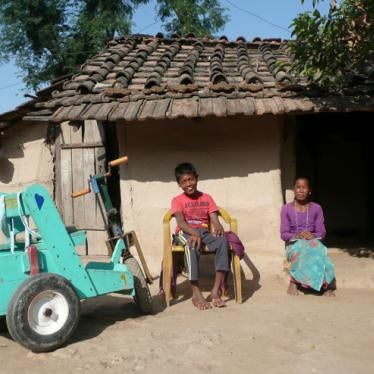(Cairo) – Governments around the world should reform laws that limit the capacity of people with disabilities to vote, to make independent decisions, or to live in the community, Human Rights Watch said today in an essay in its World Report 2012.
Government laws restricting legal capacity have caused severe problems for people with mental and physical disabilities in exercising their rights to health, political participation, access to justice, and freedom from arbitrary detention, Human Rights Watch said. In many countries, national laws deny people with disabilities the full rights of citizenship, in some cases allowing them fewer rights than children.
“People with disabilities should have the same rights and the right to equal recognition under the law as everyone else,” said Shantha Rau Barriga, disability rights researcher and advocate at Human Rights Watch. “With new democracies emerging in the Arab region, there is a ripe opportunity to make sure that people with disabilities are not denied their voice and their vote. They must be visible, meaningfully included, and engaged.”
In its 676-page World Report 2012, Human Rights Watch assessed progress on human rights during the past year in more than 90 countries, including popular uprisings in the Arab world that few would have imagined. Given the violent forces resisting the “Arab Spring,” the international community has an important role to play in assisting the birth of rights-respecting democracies in the region, Human Rights Watch said in the report.
Under the Convention on the Rights of Persons with Disabilities (CRPD), which entered into force in May 2008, governments are required to respect the right of people with disabilities to make choices about who to vote for, where and how to live, and if and when to have a family. To date, more than half of the world – 109 countries – have ratified the treaty.
Despite the protections outlined in the treaty, most countries maintain a system of guardianship for those deprived of legal capacity. Guardians are usually appointed by a court and make decisions on the person’s behalf. But such power often creates an opportunity for abuse – emotional, financial, and sometimes even physical.
To combat the abuses, governments should develop supported decision-making mechanisms that ensure that a person’s rights, will, and preferences are respected, Human Rights Watch said. So far, no government has completed the complex transition from substituted decision-making – the guardian concept – to a system of autonomous decision-making with adequate support mechanisms, as the treaty requires.
People with disabilities are often stripped of their legal capacity under the guise of “protecting” them from the challenges of decision-making and living independently, Human Rights Watch said. “It happens to all persons with disabilities,” Jennifer, a woman with a physical disability in northern Uganda, told Human Rights Watch. “It is as if we weren’t human.”
In Croatia, for example, Human Rights Watch found that more than 70 percent of people with intellectual or mental disabilities living in nine institutions were there without their consent or the opportunity to challenge the decision to keep them there. Living out grim and regimented days, they cannot even take a shower in private and are deprived of the ability to make even basic decisions, including what to eat and what time to sleep. Many residents have been there for most of their lives. As one young woman, Marija, said, “Once you enter, you never leave.”
In Peru, the government excluded more than 23,000 people with intellectual and mental disabilities from the voter registry before the April 2011 presidential election. The decision was based on assumptions that people with such disabilities are incapable of making decisions on their own, and that the government was “protecting” them from being penalized for not voting.
Pressed by local disability rights advocates and the Ombudsman’s Office, the government invited people with disabilities to register. But with limited time and poor communication regarding the change in policy, fewer than 60 people with disabilities were added back to the roster before the election.
The CRPD – the most recent comprehensive human rights treaty – reaffirms that people with disabilities have rights, and challenges the inequality and discrimination inherent in laws that infantilize them. Disability is described as long-term physical, mental, intellectual, or sensory impairments that – becauseof physical, communication, and attitudinal barriers – limit inclusion and full participation in society. Respect for inherent dignity, independence, individual autonomy – including the freedom to make one’s own choices, and non-discrimination – are among the treaty’s core principles.
“The ratification of the CRPD by half the world's countries in just four years is an incredible success,” Barriga said. “People with disabilities led the development of the treaty and are leading the even tougher part of the process – developing innovative strategies for supportive decision making and for the fulfillment of all rights.”







